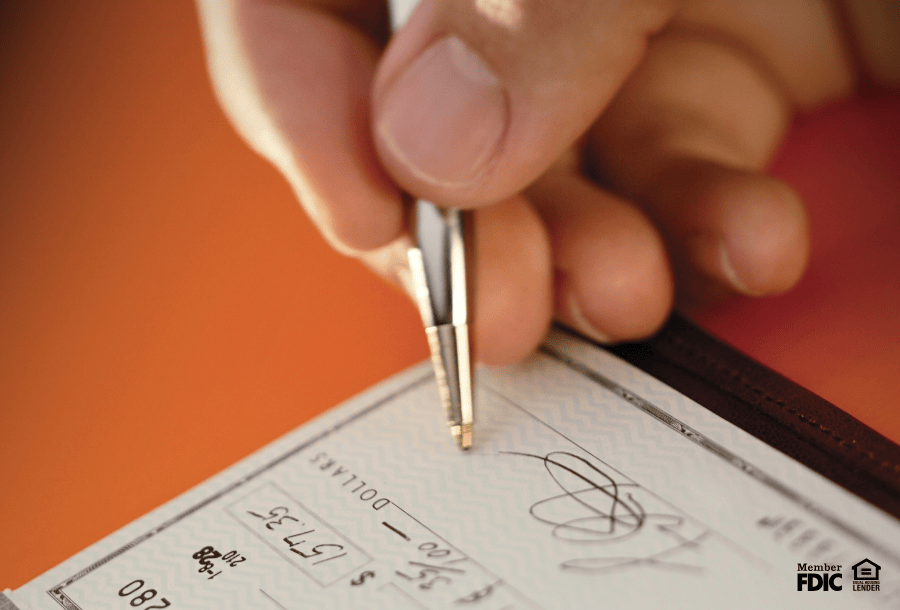
Contact Us
Bank Routing Number
107001481
Bank by Mail/General Mail
PO Box 26458
Kansas City, MO 64196
Deposit Only Mailbox
PO Box 26744
Kansas City, MO 64196
Phone Number
1-877-712-2265
Download our app
Access your
accounts here.
accounts here.

Grab your phone and scan the code to download!
not featured
2025-03-28
Savings
published
2-minute
Is a Money Market Account a Checking or Savings Account?

-
-
Money market accounts often cause confusion. Are they checking accounts? Are they savings accounts? Or are they an entirely different thing? Spoiler alert: they don’t fit perfectly into either category, which is why they are a popular option for people who want flexibility and higher returns.
Wondering if a money market account is right for you? Keep reading! This article breaks down money markets and compares them to checking and savings accounts.
What is a Money Market Account?
A money market account is a type of deposit account that combines features of both checking and savings accounts. It typically offers tiered interest rates that are based on your account balance. Plus, it provides check-writing capabilities and debit card access, making it adaptable for savers who occasionally need to tap into their funds.
If you are interested in a deeper breakdown about money market accounts, read The Pros and Cons of Money Market Accounts.
Checking vs. Savings Accounts: How Money Markets Compare
Money market accounts exist in the gray area between traditional checking and savings accounts. Here’s how they are similar to each account type:
Similarities to Checking Accounts
- Check-Writing Capabilities: Checking accounts get their name because they allow you to write checks—no surprise here. Similarly, you can write checks from a money market account, which is something most savings accounts don’t offer.
- Debit Card Features: Many money market deposit accounts provide debit cards for transactions, giving you quick access to your money without taking a trip to the bank.
- Online and Mobile Banking: Like checking accounts, money markets allow you to manage funds using mobile apps or online banking platforms.
Similarities to Savings Accounts
- Higher Interest Rates: Money market accounts are similar to traditional savings accounts because they have higher interest rates. In fact, they often offer tiered rates (where the interest rate increases with your balance), which make your savings grow faster.
- Minimum Balance Requirements: Like savings accounts, money markets often require you to maintain a minimum balance to avoid monthly fees or qualify for the best money market rates.
- Withdrawal Limits: Banks often limit money market withdrawals (like checks or transfers) at six per month. Go beyond that, and you may face fees.
- Encourages Saving: With fewer transaction opportunities, money markets are designed to help you save rather than spend.
- Overdraft Backup: Depending on your bank, a money market account can be a source of overdraft protection for your linked checking account.
So, is a Money Market Account Checking or Savings?
The short answer? Money markets are hybrid accounts that lean more toward savings. While they do offer the option for transactions like checking accounts, they are primarily designed to help you build your wealth with high interest rates.
Scenarios where a money market account could be a smart choice:
- You want better returns on your savings
- You value liquidity
- You have larger account balances
- You still want ability to make occasional transactions
Open a Money Market Account at Academy Bank
Money market accounts strike a balance between earning interest and accessing your funds. Whether you are saving for a rainy day or looking for a smart tool to manage your finances, a money market could be the solution you have been looking for.
At Academy Bank, we understand financial goals vary from person to person. That’s why our money market deposit accounts are created for flexibility and growth. Here’s what makes them stand out:
- Competitive Interest Rates: Enjoy some of the highest money market rates around. With rates as high as 4.00% APY for six months, your savings increase faster!
- Easy Access: Write checks, use your debit card, or withdraw funds any time.
- Options for Everyone: We offer both personal and business money market accounts, plus specialized accounts for retirement funds and homeowners associations (HOAs).
- Overdraft Protection: Link your money market account to your checking for peace of mind—say goodbye to those awkward overdraft moments!
- FDIC Insurance: Rest easy knowing your funds are protected up to the maximum amount allowed by law—because your money deserves to be safe and sound!
- Digital Banking & Account Alerts: Manage your finances with our simple digital banking platform. Get real-time account alerts to keep your finances on track.
Make your money work harder for you. Take the next step and explore our Academy Bank money market accounts today: Personal Money Market1, Money Market IRA2, Business Money Market3, or HOA Money Market.
Looking for something else? Compare our checking accounts and other savings options to find the perfect fit!
1 Minimum $25 deposit to open the Premier Money Market Account. A monthly service charge of $10 will be imposed every month or statement period if the balance in the account falls below $1,000 on any day of the month or statement period. Six (6) transactions per statement allowed. Excessive withdrawal fee of $10 per item over 6 withdrawals per statement cycle. Free eStatements or $5 paper statement monthly fee. Closing your account within 90 days of opening will result in a $25 early closure fee.
2 A minimum deposit of $25 is required to open a Premier Money Market IRA account. Debit cards, ATM cards, or checks are not available because IRS regulations require withdrawals to be properly coded for IRS reporting requirements. A minimum balance fee of $10 will be imposed every month or statement period if the balance in the account falls below $1,000 on any day of the month or statement period. You will have view or inquiry only access to Digital Banking. An account statement will be provided monthly. You are limited per the IRS regulation regarding contributions based on age, income, and other factors. Early or premature withdrawals from an IRA may be subject to a 10% early withdrawal tax from the IRS. Closing your account within 90 days of opening will result in a $25 early closure fee.
3 Minimum $25 deposit to open the account. A minimum balance fee of $10 will be imposed every month or statement period if the balance in the account falls below $1,000 on any day of the month or statement period. Free monthly eStatement or $5 paper statement. Excessive withdrawal fee of $10 per item over 6 withdrawals per statement cycle. Closing new accounts within 90 days of opening will result in a $25 early closure fee.



